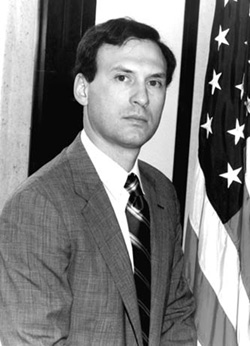Congress/Courts Study Use of Unpublished Opinions

Judge Samuel A. Alito Jr. (3rdCir.)
The subject of "unpublished opinions" raises many difficult issues that should be addressed on several different levels, a federal judge told a House subcommittee at a congressional hearing held June 27, 2002.
"Whether the benefits of uniform procedures governing citation of opinions outweigh the flexibility of local procedures is subject to no easy answer," said Judge Samuel A. Alito Jr. (3rd Cir.). "The federal Judiciary is actively engaged in studying the experiences of the courts and all the implications regarding the appropriate use of unpublished opinions. "
Alito, representing the Judicial Conference, testified before the House Subcommittee on Courts, the Internet and Intellectual Property, which is studying the issue. He chairs the Conference Advisory Committee on the Federal Rules of Appellate Procedure.
"We welcome the oversight of Congress and look forward to any new information that it may gather on this important issue, " Alito said.
Most final decisions of federal appellate courts are unpublished and do not appear in official court volumes, and most appeals courts either prohibit or limit the citing of "non-precedential" opinions from earlier, unpublished decisions. All of the appeals courts agree that unpublished opinions are not binding precedent.
Also testifying at the hearing was attorney Ken Schmier, chairman of Committee for the Rule of Law, a group concerned with the issue of unpublished opinions. The group says that 93 percent of the decisions of the California Court of Appeals and 85 percent of those of the Ninth Circuit Court of Appeals are not published and may not be brought to the attention of any court as legal precedent or otherwise.
No uniform rules currently govern an appeals court’s policy on unpublished opinions, but the Department of Justice has proposed specific language to amend the Federal Rules of Appellate Procedure and provide for uniform procedures governing the citation of unpublished opinions.
Alito said his committee will consider that proposal at its November 2002 meeting.
"The Judiciary has been concerned that the universal publication of opinions would either produce a deterioration in the quality of opinions or impose intolerable burdens on judges in researching and drafting opinions," Alito said. "It would be virtually impossible for the courts of appeals to keep current with their caseloads if they attempted to produce such an opinion in every case."
"Responsible appellate judges must devote more time to an opinion that changes the law or clarifies it in an important way, and may thus affect many litigants in future cases, than to an opinion that simply applies well-established law to specific facts, and thus affects solely the litigants at hand," he said.
The federal rules govern procedure, practice, and evidence in federal courts. Congress has authorized the federal Judiciary to prescribe the rules of practice, procedure, and evidence for the federal courts, subject to the ultimate legislative right of Congress to reject, modify, or defer any of the rules.
Meetings of the rules committees are open to the public, and all records of the committees, including minutes of committee meetings, suggestions and comments submitted by the public, statements of witnesses, transcripts of public hearings, and memoranda prepared by the reporters, are public. Proposed amendments to the rules are published on the Judiciary’s web site: www.uscourts.gov.
|
 Previous Previous |
Back to Contents | Next 
|
